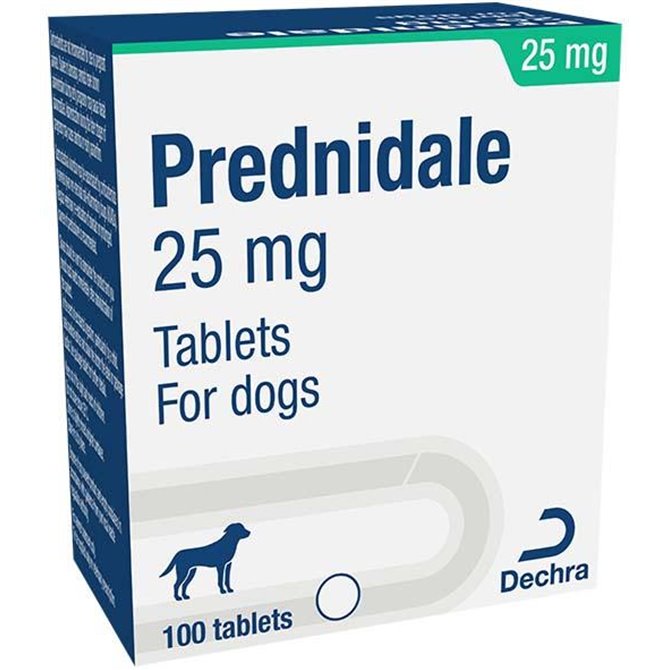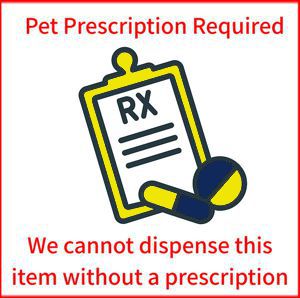
25mg Prednidale Prednisolone Tablet - per Tablet
240904
Product Features
- Pack Size: - Sold Individually
- Target Animal: - Dog (Canine)
- Pet Prescription Required?: - Yes (For UK Orders)
- Active Ingredient: - Prednisolone
- Product Name: - 25mg Prednidale Prednisolone Tablet - per Tablet
More Information
Description
This medication may only be supplied with a valid veterinary prescription issued by your vet. You should only purchase this item if you have or are in the process of arranging such a prescription. See information bar for further details.
Priced per Tablet
Prednidale are white 11 mm circular tablets. Each Prednidale tablet contains 25 mg prednisolone.
Prednidale 25 is indicated in the treatment of inflammatory and allergic conditions in dogs.
Prednidale Dosage and administration
Dose: 0.1-2.0 mg prednisolone per kg body weight per day. The lowest effective dose must be used. These tablets are not appropriate when dosing small dogs at the lower recommended dosage rates and the 5 mg tablet size may be required. Treatment should not be withdrawn suddenly. A gradual reduction of dosage is recommended. Dogs should be dosed in the morning to coincide with the endogenous cortisol peak. A single administration may be sufficient for some conditions such as anaphylaxis. Other conditions may require treatment for between two and three weeks. Use the lowest effective dose. Alternate-day therapy should be implemented to control symptoms if possible to minimise the risks of adrenal insufficiency. For animals with tumours responsive to corticosteroid therapy use dose levels based on the surface area of the animal. In some cases dose levels of 20 mg per m2 reducing to 5 mg per m2 have been found useful. For oral administration only.
Contra-indications warnings etc
Do not use in pregnant animals those suffering from diabetes mellitus in animals with renal insufficiency or those with corneal ulceration. Do not use in animals being vaccinated with products containing live organisms. Treatment may render concurrent vaccination inoperative. Appropriate therapy should be instituted in animals with concurrent bacterial infections. Use of corticosteroids may exacerbate viral infections. Prolonged use at high dose levels may result in undesirable effects. Do not withdraw corticosteroid therapy suddenly. Signs of overdosage should be treated symptomatically. Serum electrolytes should be monitored. Consideration should be given to the use of antimicrobials due to the potential suppression of the immune system. Corticosteroids including prednisolone have a wide range of effects. Polydipsia polyuria and polyphagia may develop particularly during the early stages of therapy. In the longer term iatrogenic Cushing�s disease may develop. Gastrointestinal ulceration has been reported in animals treated with corticosteroids. Steroids may cause enlargement of the liver (hepatomegaly) with increased serum hepatic enzymes. Corticosteroid therapy may lead to increased time in the healing of wounds and to a reduction in the ability of the body to resist infection. Appropriate anti-infective therapy may be required. Pharmacologically active dose levels may lead to atrophy of the adrenal cortex resulting in adrenal insufficiency. This may become apparent particularly after withdrawal of corticosteroid treatment. Adrenal insufficiency may be minimised by institution of alternate-day therapy if practical. The dosage should be reduced and withdrawn gradually to avoid precipitation of adrenal insufficiency. Corticosteroids are not recommended for use in pregnant animals. Studies in laboratory animals have shown that administration during early pregnancy may cause foetal abnormalities. Administration during the later stages of pregnancy may cause abortion or early parturition. Gastrointestinal ulceration may be exacerbated by corticosteroids in animals given non-steroidal anti-inflammatory drugs (NSAIDs). Regular veterinary re-evaluation of animals on prolonged courses of prednisolone is recommended. Operator warnings: In the event of accidental ingestion particularly by a child seek medical advice and show the doctor the label or the package insert. Gloves should be worn to administer the product and you should wash hands immediately after administration of the product. General precautions: For animal treatment only. Pharmaceutical precautions Do not store above 25�C. Store in tightly closed original container. Store in a dry place. Keep out of the reach and sight of children. Disposal: Dispose of any unused product and empty containers in accordance with guidance from your local waste regulation authority.
Legal category
Prednidale is a POM-V (Pet Prescription Required)





